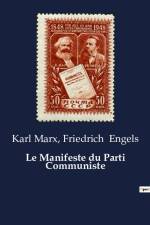av Friedrich Engels
279
Le Manifeste du parti communiste (en allemand : Manifest der Kommunistischen Partei) est un essai politico-philosophique commandé par la Ligue des communistes (ancienne Ligue des justes), et rédigé en allemand par Karl Marx (qui intègre dans le texte certains passages écrits antérieurement par Friedrich Engels).Écrit fin 1847 et début 1848 et publié en février 1848, il a été diffusé à l'origine sous le titre Manifest der kommunistischen Partei (Manifeste du parti communiste, bien qu'il n'existât alors aucun Parti communiste; le terme « parti » désignait à l'époque l'ensemble des courants partisans du communisme), et il a ensuite été republié sous le titre Manifeste communiste.Contexte et portéeUne commande de la Ligue des communistesÀ la fin des années 1840, la Ligue des justes représente la principale organisation du mouvement ouvrier. Si son évolution témoigne d'un dépassement des conceptions ouvriéristes des débuts et d'un besoin d'une conception scientifique de la révolution, sa doctrine demeure surtout inspirée par la philosophie allemande et un socialisme abstrait, ne fournissant pas de compréhension solide des structures économiques. En 1846, un Comité de correspondance communiste est créé à Bruxelles, notamment par Marx et Engels, afin d'établir un lien entre les différents groupes et de propager la conception matérialiste de l'histoire. Il finit par remporter l'adhésion de la majorité de la Ligue des justes. Lors du congrès tenu du 2 au 9 juin 1847, l'ancienne organisation se transforme en Ligue des communistes et adopte comme devise la future exhortation finale du Manifeste, « Prolétaires de tous les pays, unissez-vous ! » À l'issue de ce premier rassemblement, la Ligue ne rallie pas encore entièrement le socialisme scientifique mais encourage à la propagation des idées communistes, ce qui tranche avec les pratiques conspiratrices antérieures2.Au sortir du congrès de juin, la Ligue diffuse un Projet d'une profession de foi qui prend la forme de 22 questions-réponses et invite les membres à en discuter. À la suite d'une proposition édulcorée de Moses Hess, Engels rédige un brouillon qui prend la forme d¿une véritable profession de foi, Principes du communisme, dans lequel il expose plusieurs idées reprises dans le Manifeste, comme la conception du prolétariat et les conséquences de la révolution industrielle. Dans une lettre du 23-24 novembre adressée à Marx, il suggère d'abandonner la forme catéchistique et propose le terme de manifeste4. Lors du second congrès de la Ligue, qui se tient à Londres du 29 novembre au 8 décembre 1847, Marx et Engels emportent l'adhésion générale et sont chargés de la rédaction. Engels n'étant pas présent en même temps que Marx à Bruxelles, c'est surtout ce dernier qui élabore le texte. Néanmoins, au regard de leur collaboration, il est admis qu'ils en sont tous deux auteurs5. Il paraît de manière anonyme durant le mois de février 1848, dans le contexte des mouvements révolutionnaires à Paris, après l'interdiction d'un banquet républicain le 22 février 1848. Les auteurs en reconnaissent la paternité dans une réédition de 1872, sous le titre Manifeste communiste.




























